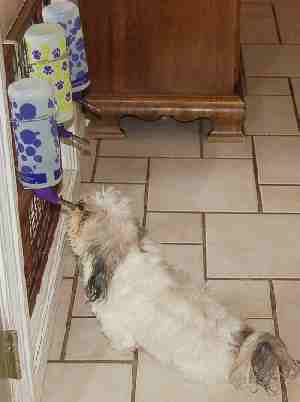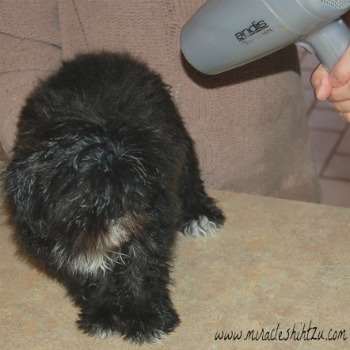- Home
- New Puppy Owner FAQ
New Puppy Owner:
Frequently Asked Questions
New Puppy Owner by Janice Jones |Last Updated 07-07-2021
I get many questions from prospective and the new puppy owner about the best way to feed, groom, train and otherwise care for their new puppy.
The following list is not meant to be comprehensive, but is a good beginning for anyone getting a new puppy for the first time and even seasoned puppy owners wanting new advice about the best way to raise a new dog.
Don’t see your question? Please feel free to ask it below and I will either email you directly or turn the question into a new page on this site. Some questions require much more detail than a simple email can provide. We welcome questions and we will surely let you know if the answers you need are beyond the scope of this site.
New Puppy Owner FAQ Table of Contents
New Puppy Owner: Diet & Nutrition
New Puppy Owner: Training
New Puppy Owner: Health Care
New puppy owner: Grooming
New Puppy Owner: General Care
Questions about Feeding & Diet
What Should I feed my Puppy?

There are so many choices available today that the plethora of dog foods can scare even the most experienced dog owner. As a new puppy owner, you might be awed by choices.
You can purchase anything from a high quality raw diet to a food sold in a discount dollar store. Between the two extremes is a vast array of nutritious diets made especially for puppies. Here the keyword is PUPPY. Until a dog has about one year old, he should be eating a high quality food made especially for puppies.
We always recommend a high quality diet for puppies preferably without grains. Manufacturers of less expensive dog foods use large quantities of fillers often corn, wheat or soy that are likely to cause problems in your dog, especially allergies.
Whatever you decide to feed, make sure you gradually wean him off of the food he is currently eating and onto your chosen brand over the course of a week or two. This will help prevent any digestive upsets and needless worry.
Please visit our other pages on Canine Nutrition and How to Read Dog Labels.
Click here to learn more about evaluating dog foods.
How Often Should I feed my Puppy?

Puppies have small stomachs that don't hold much at one time, so frequent feedings are must. Our dogs are free fed, meaning they are free to eat at any time. This works well for us because we feed kibble and have a large number of dogs. We do not worry if our busy schedules interfere with our dog’s regularly scheduled mean times and we don’t have to worry about a puppy experiencing hypoglycemia because dinner was late.
Not everyone agrees with this method of feeding, so if you prefer a regularly scheduled meantime, we suggest that puppies eat on the following schedule.
8 weeks until 6 months: 3 times per day
6 months to 1 year: 2 times per day
1 year and up: 1 to 2 times per day
Click here for more information about feeding a Shih Tzu
Can I use a Water Bottle instead of a Bowl?
Yes, many people especially show dog owners use water bottles to help keep the hair around the face cleaner and dry. Water bottles also offer fresh water that has not been contaminated by saliva, dirty faces or paws, or other germs that are often associated with water bowls.
As a new puppy owner, you probably associate water bottles with your childhood pet hamster, but they work well for dogs too. A large water bottle used in a rabbit hutch works well as well as commercially available bottles specifically designed for dog. If you choose to use a water bottle, be sure to wash it out well each day as you would a bowl. If opting for a water bowl, a stainless or ceramic bowl is best.
Questions about Training
Potty Training?
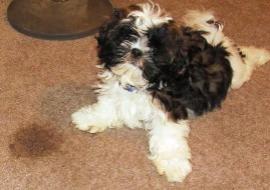
One of the hardest tasks to accomplish as a new puppy owner is housebreaking. Puppies have little bladders and will need to eliminate regularly.
House training should always be a positive experience for both puppies and owners and can be accomplished faster when everyone in the household is essentially using the same methods.
Puppies need to go out or to their potty place:
- After they eat or drink water (usually within 15 minutes)
- After they wake up from a nap and first thing in the morning
- After training, playing, or exercising
- Before being put in a crate
- Before bedtime
Consistency pays off and will make training much easier. The dog will be able to anticipate the schedule and know what you want him to do if his daily routine remains the same.
Relax and know that accidents are going to happen. If you happen to catch the puppy squatting where he should not, pick him up and take him to the correct location. If you encounter an accident, simply clean it up. Punishment is useless and any harsh scolding will only cause the puppy to be more anxious and fearful.
Read more about Puppy Housebreaking
When do I start training?
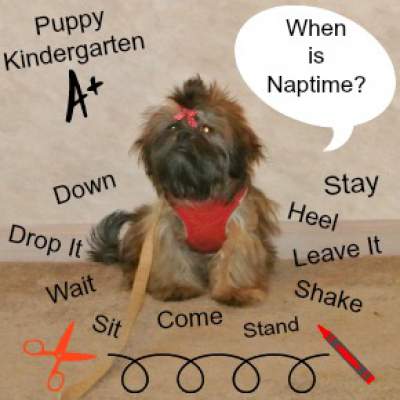
There was once a time when puppies did not begin any former training until they reached 6 months of age and were fully immunized. Nowadays, many puppy classes are available for puppies as young as 8 weeks of age. Most require at least one vaccination, but allow for socialization and play as well as learning some basic commands.
Puppies should begin their training as soon as they arrive at your
home. The first and most important skill
is house training, learning to walk on a leash and basic commands can be taught
to very young puppies. For a new puppy owner, it might mean learning a whole new vocabulary that both people and dogs can understand.
Some basic commands that puppies can learn include:
Drop it
Take it
Wait
Read more about Shih Tzu Puppy Training
Read more about Puppy Kindergarten
Questions about Health Care
What vaccinations will he need?

Vaccinating pets is one of those topics that has everyone confused, experienced as well as new puppy owners. All puppies need vaccinations. There is usually little debate over this initial protection.
Vaccine schedules are usually made by your veterinarian and it is best to follow his/her protocol. The initial puppy vaccination is given between 6 and 8 weeks old. Giving inoculations too early will be ineffective due to the fact that the puppy may still have maternal antibodies in his system.
High levels of maternal antibodies will block the effectiveness of a vaccine, essentially making it useless. One will neutralize the other. Starting them too late will leave the puppy unprotected and susceptible to the disease.
Since the maternal antibodies do not disappear at exactly the same time, vaccines are given approximately every 3 to 4 weeks. All puppies should receive the core vaccines and depending on where you live and your lifestyle, perhaps other non-core vaccines.
The core vaccines are: Rabies, canine distemper, canine parvovirus, and canine adenovirus-2, which protects against canine hepatitis.
Non-core vaccines are leptospirosis, measles, coronavirus, giardia, kennel cough (Bordetella and parainfluenza), Lyme disease, and canine influenza
Once fully vaccinated, a puppy should receive a booster at one year of age and then again about every 3 years. This is different from the once held belief that dogs needed shots on an annual basis.
It is also not certain whether dogs need vaccines every three years so many opt to have titers done to determine if the dog is still protected from the disease.
How do you Worm a Dog?
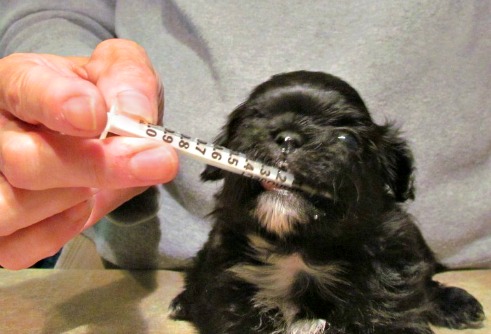
Most worming medications are liquid and are given orally through a syringe or eye dropper to a puppy at regular intervals, usually beginning at two weeks of age. We worm for all forms of intestinal parasites plus Coccidia and Giardia.
Once getting a dog, it is important for the new puppy owner to take a stool sample to the vet during your first visit so they can check for worms and prescribe any medication if needed. Our best advice for all new puppy owners is to assure their dog is free from internal parasites.
Read more about Internal Parasites.
How big will he be as an adult?

Everyone wants a guarantee about the size of their puppy when full grown. Unfortunately there is no magic answer to that, just speculation. You can look at the mother and the father and get a general idea, but even that is not 100% accurate because you can also have very large or very small ancestor genes popping up. Nutrition and exercise also have a major bearing on the size of the adult dog.
As a general rule of thumb, a dog’s weight at 12 weeks can be doubled to give a ball park idea of his future weight. For example, if he weighs 5 pounds at 3 months, he is likely to be in the 10 pound range as an adult. No guarantees!! Sorry, new puppy owners!
My puppy is snorting and breathing fast. What is wrong with him?
Brachycephalic dogs have short, flat noses making it more difficult to breath. When their noses are especially small or if the opening is not large enough, air has a harder time entering and leaving and the dog tends to snort.
All brachycephalic dogs have problems of varying degrees, most though are very healthy and show little stress. Some do snort, snore, or otherwise have noisy breathing, without cause for concern. Only your veterinary will be able to tell you for sure if your puppy might have a problem.
My puppy has diarrhea. What should I do?
Diarrhea can be a common problem in puppies but it is not something to ignore. There are many possible reasons why a puppy might get diarrhea. Parasites such as Coccidia and giardia can cause loose stools. Other possible causes of soft stools include:
- A puppy who had an abrupt change in diet
- A puppy who consumed too much food at one time
- A puppy who ate something he was not supposed to eat (garbage)
- A puppy who is stressed, overly excited, or exercised too much.
The best thing a new puppy owner can do is to obtain a stool sample and call your vet. A quick fecal check will rule out the presence of parasites, but if the stools are watery or loose with visible blood, be sure to make an appointment to see the vet.
New Puppy Owners: Grooming
How often should I groom him?
Long coated puppies require brushing several times a week, but to make grooming a pleasurable event for you and your dog, we recommend a daily brushing. This is not only a good time to teach the puppy sit, stand, down and stay, but it is also a wonderful time to bond.
Puppies need a bath when they are dirty but usually every 3 weeks is a good rule of thumb. (More often if he likes to go out roll in the grass, or tromp through the mud. Most long haired puppies need a professional grooming by the time they are 6 months old and then approximately every 6 to 8 weeks thereafter.
Learn more about Shih Tzu Grooming
Questions about general care
My puppy sleeps so much. Is that normal?

Dogs sleep more than people, even adult dogs. Each dog is different but puppies often sleep anywhere from 18 to 20 hours a day. Some breeds are much more active than others.
Shih Tzu dogs are generally less active than other breeds and because of this, the new puppy owner can get overly concerned. Even my adult dogs sleep far more than I could ever wish for. On average, a puppy will eventually sleep all night long, falling asleep before his person and awakening when the people get up.
After a brisk walk, breakfast and some play time, puppy is ready to sleep again. This time his nap may be a couple of hours. By noon, he’s ready to play, eat and eliminate. He might have bursts of high energy where the only thing he can think about doing is running at top speed.
Soon, however, he’ll be tired and begin another nap. This one will last until dinner, where the noontime ritual is repeated. Again, he will be happy to play, walk, or exercise until it’s time for his evening nap. This may last until bedtime or preferably until it’s time to take the last walk of the day.
This scenario is obviously fictitious and each dog’s situation will determine how much he sleeps. It is likely that your puppy will sleep while you are away and be fully awake the minute he hears you return.
If you work from home he is likely to follow you from room to room, falling asleep whenever he can. Weekends may mean fewer zzzzs but he will make it up on Monday when you return to work.
To make a long story short—puppies sleep a lot so don’t be alarmed.
What can I do to Help my Puppy Adjust to His New Home?
New owners always worry that they are robbing the mother dog of her little ones. Once they get over this fear, the next question is how can I help him adjust to his new home. There is no question that an eight week old puppy uprooted from his mother and siblings and placed in a new environment is going to need some time to adjust.
If you know what to expect, it is much easier on you and the puppy. His first few nights in a new home may not be the easiest, but with proper planning, the transition period can be swift and painless.
Shih Tzu Puppy's First Few Nights
Do you recommend microchips?
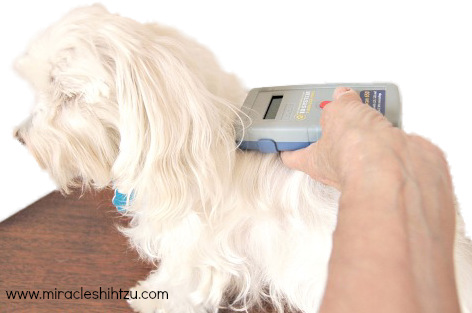
Microchips are not a fool-proof way to keep your dog safe, but they certainly help if your dog were ever to get lost. Microchips are about the size of a large grain of rice and are injected under the skin of the puppy between his shoulders. Although the needle is a little larger than one used for vaccines, the shot usually does not bother the dog.
Once inserted, you will need to register with the appropriate agency and keep them updated should you ever move. The major problem with microchips is that there is no one universal system and many companies make them, often with different frequencies.
Currently there are 3 different types of microchip frequencies available in the United States and one is at the mercy of the scanner as to whether the scanner will be able to read the specific frequency.
Most new scanners are able to do this, but there is no guarantee. If your dog gets lost and ends up at a shelter, let’s hope your shelter can read the microchip! With that said, your dog is still much more likely to be returned to you if you have microchiped him.
If you purchase a puppy from Miracle Shih Tzu, she or he will be microchipped before leaving here.
Is it OK to crate my puppy while I'm at work?
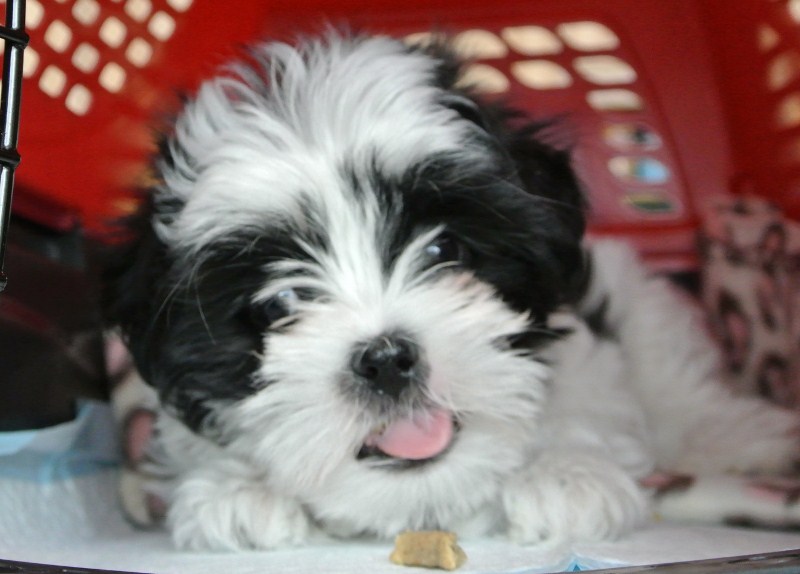
A puppy can stay in a crate for short periods of time, but it is unrealistic to expect the puppy to remain in a crate for 8 to 10 hours at a time.
Many people will block off a small area in their home where the puppy will stay while they work.
Infant gates and x-pens work well for this. Inside the enclosure you can place the crate with the door open, his food and water, a few toys and chews and some potty pads. With this method, you can walk him before you leave for work and upon returning home.
If at all possible, we recommend having someone available to take the puppy out at noon.
This is one of the hardest things for new puppy owners to deal with, but it will get better. As the dog matures and has had adequate training, he will be able to stay in the crate for longer periods of time.
Do I need to do anything to get my house ready for the new puppy?
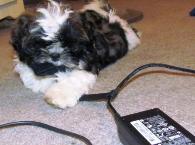
I definitely recommend that you do a little Puppy Proofing which is the same as child proofing. You will be looking at anything that might be unsafe for the puppy, anything that could make them sick, and anything they could destroy that is precious to you.
This means a few alterations may need to be made such as removing poisonous plants, blocking off an area that is safe for puppy and making sure that there is nothing the puppy could destroy.
Read More about Puppy Proofing
Do You Recommend Any Special Supplies?

There is no getting around it, new puppies (like new human babies) require a few things to keep them happy, safe, and contented. The supplies need not break the bank and many can be purchased gradually over time. Some things, however, like food bowls, leashes, and collars may need to be purchased early on.
Read more about Puppy Supplies to Purchase.
Are you a new puppy owner and still have questions?
Please feel free to ask--submit the form below. We will try to cover it here or on a separate page. Need to contact us directly? Click Here to contact us.
Ask a Question
Have a question? Want to suggest a new topic? Have something to say? Here's the place.
What Other Visitors Have Said
Click below to see contributions from other visitors to this page...
Help My Puppy Sleep Through the Night 




I have a 4-month-old Shih Tzu cross and every morning it's getting earlier and earlier for him to start barking. I let him out to go toilet and put him …
Help, My Puppy is Not Eating! 




Hi there just picked up our puppy 8 weeks old a couple days ago. He was eating well then suddenly changed. He doesn't have any appetite to eat the same …
Watery eyes 




I just bought a shih tzu he is 10 weeks old and his eys are watery all the time is this normal or is it a problem? The lady told me it was probably from …
Walking my shih tzu puppy 




Hi,im just wondering how many times a day i should walk my 3 month old shih Tzu? I was thinking twice a day,is that too much at that age?
thankyou.
Leona. …
When can your pup travel? 




I am thinking about picking up my puppy and then driving back to my house which is a couple states away. Will this be to stressful ? I heard that it's …
How Can I Manage Distractions with My Shih Tzu Not rated yet
Hello,
A week ago, I got a sweet girl (Shih Tzu). She turned one yr.old in June of this year.
I have taught her quite a lot in this period of time. …
How to Keep a Shih Tzu Puppy Out of a Big Dog's Water Bowl Not rated yet
Hi, I have a golden retriever and Shih Tzu puppy. I bought a water bottle and my Shih Tzu uses it but also uses the other bowl. How do I keep him out of …
House Training a Small Shih Tzu Puppy Not rated yet
Getting a Shih Tzu puppy who will be seven weeks old. I live on my own and I'm in my early 60s. can you please tell me will it be easier to house train …
Puppy Nipping Not rated yet
When do puppies stop nipping hands and feet?
When you first bring home a tiny puppy, you might think that nipping is cute and in your excitement to …
Puppy Drinking Water Not rated yet
My new 8 week old puppy seems like he can't get enough to drink. He just got his first shots the day I got him. Is this normal? Should I let hime drink …
Problem Behaviors in a Six Month Old Shih Tzu Not rated yet
I bought my Shih Tzu at 8 weeks from a pet store. I have had her in two different puppy training classes but she bites me sometimes when I take something …
"Hi, I'm Janice Jones, a former veterinary technician and Shih Tzu expert with over 40 years of experience with the breed. Through Miracle Shih Tzu, I combine my medical background and extensive breed knowledge to provide reliable, practical advice for Shih Tzu owners. My mission is to help you give your Shih Tzu the happiest, healthiest life possible through evidence-based information and real-world solutions. Whether you're new to the breed or a seasoned owner, you'll find trusted guidance here for all aspects of Shih Tzu care.
I hold an undergraduate degree in Psychology with a minor in biology, Early Childhood Education, and Nursing, and a Master's in Mental Health Counseling.

